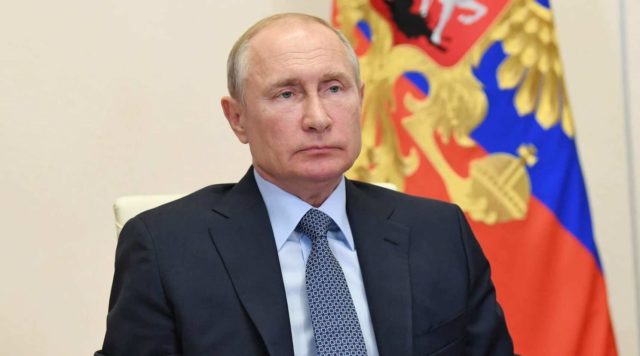
What is NATO, and what role will it play in Russia’s attack on Ukraine? 5 brief facts Russia's President Vladimir Putin. (Alexei Nikolsky/Russian Presidential Press and Information Office/TASS/Abaca Press/TNS)
As Russia invades Ukraine in what Russian President Vladimir Putin calls a “special military operation” — seen by Ukrainian President Volodymyr Zelenskyy as a “declaration of war” — a major alliance has vowed to defend Ukraine.
While Ukraine is not a member of the North Atlantic Treaty Organization, known as NATO, the alliance says it stands ready to assist in what it calls “Russia’s unjustified and unprovoked attack on Ukraine.”
Here’s what you need to know about NATO and its role in the Russia-Ukraine conflict.
What is NATO?
NATO is a group of 30 member countries that agree to work together to ensure the security of the Northern Atlantic area.
“NATO’s purpose is to guarantee the freedom and security of its members through political and military means,” according to its website. Politically, the alliance promotes democracy, and it allows its members to “consult and cooperate on defence and security-related issues to solve problems, build trust and, in the long run, prevent conflict.”
The alliance says it is committed to “peaceful resolution of disputes,” but if diplomatic efforts do not work, NATO says “it has the military power to undertake crisis-management operations.”
Its “crisis-management” can include military operations before, during and after conflicts and may be carried out as part of Article 5 of the Washington Treaty. In that article, “members agree that an armed attack against one of them in Europe or North America will be considered an attack against them all,” McClatchy News previously reported. “They agree that each of them will assist the parties attacked by taking any action deemed necessary, including the use of armed force.”
NATO was formed by the U.S., Canada and several Western European countries in 1949 “to provide collective security against the Soviet Union.”
What nations are in NATO?
There are 30 independent countries that belong to NATO, all in Europe and North America.
Those nations are Albania, Belgium, Bulgaria, Canada, Croatia, the Czech Republic, Denmark, Estonia, France, Germany, Greece, Hungary, Iceland, Italy, Latvia, Lithuania, Luxembourg, Montenegro, Netherlands, North Macedonia, Norway, Poland, Portugal, Romania, Slovakia, Slovenia, Spain, Turkey, the United Kingdom and the United States.
“Every day, member countries consult and take decisions on security issues at all levels and in a variety of fields,” NATO says. “A ‘NATO decision’ is the expression of the collective will of all 30 member countries since all decisions are taken by consensus.”
Neither Ukraine nor Russia is in NATO.
How do nations join NATO?
Countries that aspire to join the alliance should follow NATO’s Membership Action Plan (MAP), which involves work that would prepare a nation for membership. This includes outlining a country’s “political, economic, defence, resource, security and legal aspects.”
Countries that do complete MAP are not guaranteed future membership, according to NATO. Bosnia and Herzegovina is the only country actively participating in MAP.
Has Ukraine tried to join NATO?
The Ukrainian Parliament adopted legislation that reinstated the country’s goal to become a NATO member in June 2017, according to NATO. A “corresponding amendment” was added to its constitution in 2019.
Soon after, in September 2020, Zelenskyy approved his country’s National Security Strategy, “which provides for the development of the distinctive partnership with NATO with the aim of membership in NATO.”
What role will NATO play in Russia’s attack on Ukraine?
Because Ukraine is not a member of NATO, the alliance and its members are not bound to defend it. But following an emergency meeting of the North Atlantic Council, the organization did just that.
“NATO Allies condemn Russia’s invasion of Ukraine in the strongest possible terms,” NATO Secretary General Jens Stoltenberg said. “We call on Russia to immediately cease its military action, withdraw its forces from Ukraine, and choose diplomacy. We fully support Ukraine’s sovereignty and territorial integrity and Ukraine’s right of self-defence.”
In that meeting, the council decided to launch NATO’s defense plans to protect its allies under Article 4 of the Washington Treaty, which says members “will consult together whenever, in the opinion of any of them, the territorial integrity, political independence or security of any of the Parties is threatened.”
“Russia’s actions pose a serious threat to Euro-Atlantic security, and they will have geostrategic consequences,” the North Atlantic Council said in a statement. “NATO will continue to take all necessary measures to ensure the security and defence of all Allies. We are deploying additional defensive land and air forces to the eastern part of the Alliance, as well as additional maritime assets. We have increased the readiness of our forces to respond to all contingencies.”
Putin has warned other nations against getting involved in the conflict.
“Whoever tries to impede us, let alone create threats for our country and its people, must know that the Russian response will be immediate and lead to the consequences you have never seen in history,” Putin said Feb. 24, BBC News reported.
___
© 2022 McClatchy Washington Bureau
Distributed by Tribune Content Agency, LLC.




